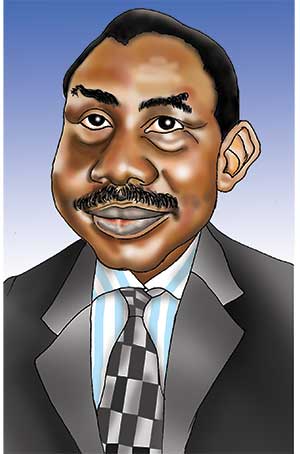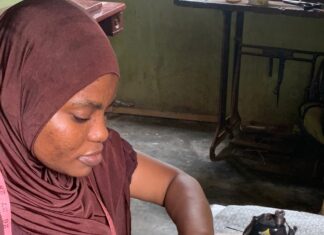26 years of his 48 have been spent in the public sphere. Nevertheless the man of ideas (an erudite scholar) and praxis (totally immersed in political activity), continues to punch above his slender frame …., according to Kanmi Ademiluyi
The national legal adviser of the All Progressive Congress (APC)
 wears his two hats well. He has not abandoned the intellectual framework as he presses on in the rough and tumble of Nigeria’s primordial politics. He navigates it so well. Here in this regard, there are echoes of the first republic parliamentarian and federal minister, the illustrious Raymond Amanze Njoku. Njoku stood out from the crowd by concealing a ruthless political streak behind the public persona of an urbane, cosmopolitan intellectual.
wears his two hats well. He has not abandoned the intellectual framework as he presses on in the rough and tumble of Nigeria’s primordial politics. He navigates it so well. Here in this regard, there are echoes of the first republic parliamentarian and federal minister, the illustrious Raymond Amanze Njoku. Njoku stood out from the crowd by concealing a ruthless political streak behind the public persona of an urbane, cosmopolitan intellectual.
Prodigious intellectual output
Banire’s 2005 doctoral thesis in Property Law was on: “Evolving Alternative Legal framework for land management in Nigeria.” He continues to produce a prodigious output of text and practice books, articles and papers. The titles look quite dry if you are not a legal practitioner. For example, a work he has produced examines “Land Management: Towards a New Legal Framework,” Ecowatch publications, 2005 and papers of erudition such as a review of a Landmark judgement: “The Limit of Consent provisions: A review of Savannah Bank Limited v Ajiho.”
In the field of Law, he did not just analyse and teach, he practiced the profession rather rigorously. His practice M.A Banire and Associates continues to have the atmosphere of a hard-driven, rather busy metropolitan legal services provider. What makes the Olowogbowo area of Lagos Island born politician driven is clearly a belief that society can still amidst the gloom and pessimism be made better.
A practical view
Given the current, hardly temporary plunge in crude oil prices, he is of the view that there is a need for a re-think about the efficacy of our current paradigm. He emphasizes that the waste of resources manifested in today’s elephantine structure has to be reworked. The answer in his obviously considered perspective lies in the “…..need to radically and fundamentally restructure government itself.”
An out-of-the-box perspective in today’s political rentier-state driven atmosphere. Unabashadly, he is of the opinion that the parliamentary system which was discarded after the collapse of the first republic is much more economical. This he has believed in, consistently, long before today’s reality check set in. He looked like an oddball at the time. It’s not just the issue of much needed cost-rationalisation; the structure itself he points out is clearly defective.
Once again, mixing theory with practice, he draws from his own experience, having been immersed in the process of government: “That is why people like me would prefer the parliamentary system because it is much more economical. Even while I was a commissioner, I used to say this and they laugh at the idea. Why must we commissioners be permanent? Let’s formulate policy and let the civil servants implement them. That is what should be done. After all, I am not a civil servant, so why should I sit from morning to night in that place? My job is simply policy formulation; I am not to implement. We should also look at where people should be employed part time and then find what else to do. Why is that we don’t and most of the directors of companies in the offices, they just come in, give you the policy direction, tell you to implement it and go. So, radically we have to restructure our system.”
With the pivotal general elections of 2015 barely a month away, the thoughtful scholar would have been less than human not to harbour his reservations about the current situation. The electoral process as is well known begins with the registration of voters. This is crucial for a democracy. Perhaps this is why countries such as Australia, Brazil and the Seychelles make voting, like the paying of taxes a compulsory obligation of their democracies.
Unfortunately, we have clearly bungled the foundation for a free and fair electoral process. He does not pull punches in stating that the voter’s registration exercise has failed. “The process is a failure already. There is no other way to put it.” The disenfranchisement is real, which is why he believes that, “the only thing that INEC can possibly do now is to give more time either for a fresh collection of the PVC or a fresh registration. Otherwise there will be a negative impact on turn-out.’’
In the aftermath of the election itself, he is not perturbed as to the current contrived hate-filled atmosphere. His response to the threat that ‘we will shut down the country, if we don’t win,’ is unambiguous. “Nobody can do that. We have this challenge where a lot of people get carried away with things that they shouldn’t be carried away with because truly there is going to be an election. For example, it is just like saying that if I don’t win an election in my area, they will not survive which is not possible. There is nobody that is extra-ordinary to that extent. You can’t be the only superman around. I am sure there are no supermen around. So it is just a mere threat.”
Obviously, he is rooting for an APC victory in the elections. He is optimistic that if this happens, it will not be yet another false dawn. “For me honestly in APC, what we should be expecting is foundation laying, because this country is very sensitive now. We can’t just go to the government and start saying we want to move the country forward immediately; we will be putting a temporary structure. A man said that it is easier to propose the solution from outside, when he gets to the system that is when the reality dawns on him. That is when you start looking at a situation. So for me, the first two years will be the foundation laying years, which will have a major impact on the economy. For me, I am not in a hurry as a Nigerian. What I want to see from APC is a proper foundation being laid.”
He fervently believes that there has to be a complete re-orientation of the interaction between the followership and leadership. Clearly our poverty-driven politics has to undergo a sea-change. Too much of course is expected of the leadership. This of course is partly self-inflicted on the part of the political class and clearly is the result of a poverty-stricken society in which there are no social safety nets. “When I was a commissioner, my salary was 300,000 after tax. You get invitations from friends expecting you to donate money as a commissioner. Even if salary is N500,000, if you keep sharing N10,000 naira in several places, you discover that it is gone. Sometimes when you give them N10,000, they will throw it back at you’’.
There are certainly unchartered over-perilous waters ahead. This is why in the next few months the scholar turned politician will be on the front-burner as the events unfold.













